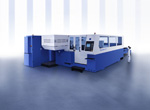9 November 2009
Leasing is the lifeblood of laser job shop
 David Connaway, the Managing Director of Cirrus Laser is a firm fan of the operating lease. He considers it to be the ideal solution in the highly competitive world of subcontract laser cutting. For him it provides the best of all worlds – the latest manufacturing technology, highly reliable machines to underpin his company’s profitability and freedom from the responsibility of disposing of old machines.
David Connaway, the Managing Director of Cirrus Laser is a firm fan of the operating lease. He considers it to be the ideal solution in the highly competitive world of subcontract laser cutting. For him it provides the best of all worlds – the latest manufacturing technology, highly reliable machines to underpin his company’s profitability and freedom from the responsibility of disposing of old machines.
“If you keep a machine for more than five years then you’re no longer employing new technology,” David Connaway explains. “And that is vital in a job shop such as ours. To remain competitive our prices must be keen. Indeed in real value terms our machine hourly rates are less today than they were 20 years ago. So to make a profit we have to make more quality parts, faster.”
Cirrus Laser has been one of the leading laser cutting, water jet cutting and laser welding job shops in the South of England since 1987. The company started the leasing programme for its Trumpf machines with a TruLaser 3030 in 2001 using a 60-month operating lease agreement. The upgraded version of this flatbed laser was the TruLaser 3030, with a second lease in the autumn of 2006 and in April 2007 a TruLaser 3530 was installed with a third operating lease.
The critical benefit of these upgrades has been Cirrus’ ability to increase its cutting speed. David Connaway cites the merits of features such as the high-speed drive on the TruLaser 3530, high speed cutting with the short focal length lens and the range of innovative piercing techniques on both of the Trumpf flatbeds that optimise production. Cirrus has been manufacturing a particular 316-grade stainless steel component on all three Trumpf machines. The original TruLaser 3030 in 2001 took 98 seconds cutting time, the 2006 TruLaser 3030 reduced this time to 68 seconds and the latest TruLaser 3530 now takes only 46 seconds to cut this same component. This represents a 53% reduction in cutting time in six years of technology!
Disposing of old machines has certainly proved a bugbear for Cirrus in the past. One particular machine took the company two years to sell. David Connaway reflects, “It was taking up vital floor space and in the end we got little financial return for it.” Conversely, at the end of the flatbed lease period it is the finance company that holds the residual value of the machine. It is also responsible for selling it on.
“This arrangement takes out all the grief for us,” David Connaway continues. “The turn round between old machine and new is quick so in less than a fortnight we are producing again and this time with the very latest sheet metalworking technology.”
An operating lease provides off-balance sheet funding that is tax efficient, removes residual value risk, removes depreciation from the P&L account and preserves working capital. Trumpf works with the customer’s preferred financier or offers it own operating lease package. Cirrus made the choice in favour of an independent finance company but as David Connaway warns, “It’s vital to choose a dedicated operating lease contract for a production machine. Be very careful with the small print, most return conditions are unfavourable to the lessee, if in doubt take advice from a solicitor with contract expertise.”
A two-year service contract has been combined with the latest TruLaser lease but Cirrus will undoubtedly extend this with future leases. “I have fixed costs on operating these machines each month and I want similar peace of mind on service too. A full term service warranty will mean Cirrus faces no unforeseen expense,” David Connaway adds.
As Chairman of the AILU Job Shop Group, David has a better view than most on trends across his industry. “Everyone wants a super-fast turnaround on their orders. Seven working days is the absolute maximum, three days is normal, yesterday an option, if we can’t work within that time frame then customers simply go elsewhere. This is why we need machines that are exceptionally reliable.”
Leasing enables Cirrus to have a constant turnover of new machines that are fully dependable. David Connaway concludes, “We are achieving better than 99.95% uptime with our Trumpf machines. We don’t run 24/7 but we do run them for 14 hours, flat out and sometimes lights out. Older machines just wouldn’t give us that performance.”
- Contact Information
- Name: Dave Connaway
- Email: dc@cirrus-laser.co.uk
- Website: www.cirrus-laser.co.uk

